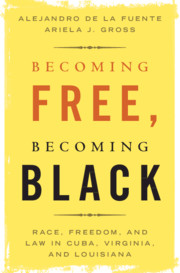Book contents
- Becoming Free, Becoming Black
- Studies In Legal History
- Becoming Free, Becoming Black
- Copyright page
- Contents
- Figures and Tables
- Preface
- Abbreviations
- Introduction
- Chapter 1 “A Negro and by Consequence an Alien”
- Chapter 2 The “Inconvenience” of Black Freedom
- Chapter 3 “The Natural Right of All Mankind”
- Chapter 4 “Rules … for Their Expulsion”
- Chapter 5 “Not of the Same Blood”
- Conclusion
- Notes
- Index
Chapter 1 - “A Negro and by Consequence an Alien”
Local Regulation and the Making of Race, 1500s–1700s
Published online by Cambridge University Press: 16 January 2020
- Becoming Free, Becoming Black
- Studies In Legal History
- Becoming Free, Becoming Black
- Copyright page
- Contents
- Figures and Tables
- Preface
- Abbreviations
- Introduction
- Chapter 1 “A Negro and by Consequence an Alien”
- Chapter 2 The “Inconvenience” of Black Freedom
- Chapter 3 “The Natural Right of All Mankind”
- Chapter 4 “Rules … for Their Expulsion”
- Chapter 5 “Not of the Same Blood”
- Conclusion
- Notes
- Index
Summary
Chapter One traces the development of local legal regimes in Cuba, Virginia, and Louisiana in which blackness was identified with enslavement and social degradation. We demonstrate that legal and social precedents such as those invoked by Frank Tannenbaum and Alan Watson mattered deeply to the development of these new slave societies, yet not in the way traditional comparisons argued. By the time the Iberians arrived in the New World, they were familiar with the enslavement of sub-Saharan Africans, and set about immediately to establish a racially based society in Cuba. In Virginia, by contrast, distinctions of race were not systematized in law until slave status was set in stone decades after the colony’s settlement. The French arrived in Louisiana at a much later point in the development of their empire, and had already written a code for slaves and “noirs.” Across the regions, colonial legislators established a degraded status for people of African descent, but they did so much more quickly in Cuba and Louisiana.
- Type
- Chapter
- Information
- Becoming Free, Becoming BlackRace, Freedom, and Law in Cuba, Virginia, and Louisiana, pp. 13 - 38Publisher: Cambridge University PressPrint publication year: 2020



